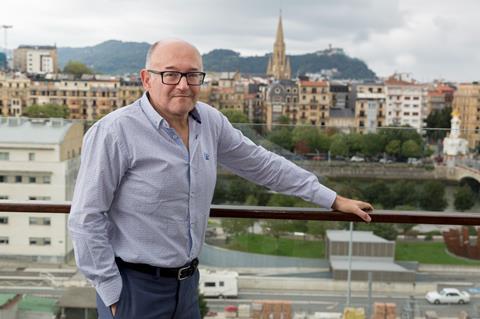
José Luis Rebordinos has been the director of the San Sebastian International Film Festival since 2011.
He talks to Screen about this year’s 70th anniversary edition which will celebrate San Sebastian’s history as well as the exciting present moment for Spanish cinema and host an expanded industry section.
The festival opens today, Friday September 16, and runs until September 24.
San Sebastian prides itself as a festival that showcases both new and established Spanish filmmakers. How would you describe the Spanish productions selected this year?
There’s a generation of filmmakers like Rodrigo Sorogoyen, Alberto Rodríguez and Albert Serra in different sections of the festival who are quite young and are already well-established. There is also a new and powerful generation of producers and directors, mainly female.
The present and the future are very promising. One of the Spanish films in competition, Suro (Cork) by Mikel Gurrea, is a first feature that started in Ikusmira Berriak [a programme of residencies and project development organised jointly by the San Sebastian Film Festival, the Tabakalera-International Centre for Contemporary Culture and San Sebastian].
The vitality of this new wave is being felt beyond San Sebastian. Elena López Riera’s The Water was a first feature that was also at the same residency and then premiered at Directors’ Fortnight in Cannes and Carla Simón’s second feature Alcarràs won the Golden Bear at the Berlinale.
It’s a sweet moment for new talents and for the industry in Spain, both for auteurs and more mainstream filmmakers. So much so that it has been very difficult doing the selection. There was so much to choose from! I’m sure very interesting films will hit the festival circuit in the upcoming months. I could say the same of Latin American productions, also cherished in San Sebastián.
You mentioned the new generation of women filmmakers in Spain. But in the official selection only two – Pilar Palomero’s La Maternal and Laura Mora’s The Kings Of The World – of the total of 17 in competition are directed by women.
Yes, but in the New Directors’ section there is parity. I believe it will gradually get to a point where parity will come with more and more filmmakers who will have had equal chances to build their career.
The streaming platforms are again present in competition.
They are, yes. Netflix is behind Sebastián Lelio’s The Wonder, starring Florence Pugh, in competition. And Movistar+ is behind two titles in the official selection, out of competition: the series Apagón (Offworld) by Movistar+ as well as the inaugural film, Prison 77, by Alberto Rodríguez.
I believe platforms are more and more open to auteur cinema and also look for more titles to have a theatrical release. But it’s also true that there are talks to be had. Currently, distribution and exhibition are in a difficult place and Spanish and European institutions should consider how to help, and consider what can we do so that part of the revenue from platforms can help exhibition. It’s a debate to be had, ideally led by Europe.
What is the position of the festival concerning Russian productions?
We obviously won’t collaborate with the Russian government but in the statement we made public about this point we clearly stated we won’t censor anybody because of their place of birth. Truth be told, we don’t usually have many Russian entries. We make our choices purely based on cinema, on the productions themselves. [The festival has also retained the competiton screening of Ulrich Seidl’s controversial film Sparta, citing the same reason.]
Can you tell us more about the new Creative Investors’ Conference, being held in the industry programme for the first time this year?
It’s co-organised with CAA Media Finance, and more than 30 top international investors have confirmed attendance including 30West, Anonymous Content, Focus Features, MUBI, Neon, Netflix and Wild Bunch International.
In the context of the Conference, 10 Spanish productions have been selected, all over the €2m budget mark and in search of financing. They will have the chance to pitch their project. The Conference will be open to all industry attendees, except a meeting with a selection of 20 upcoming talents, mainly from film schools, to have speedy one-to-one meetings with the investors. This is in line with a key policy for our festival, nurturing new talent and future filmmakers.
What do you have planned for audiences for this landmark edition?
We have set up an exhibition in the Tabakalera building that will allow visitors to explore our history, including a fun 24m screen where you walk along a compilation of red-carpet moments from the 1950s to the present day. In December we will also be able to show what we have been working on for the last four years: restoring, digitalising and sorting out the archive of the festival. It will be accessible on our site.















![[L-R]: Amanda Villavieja, Laia Casanovas, Yasmina Praderas](https://d1nslcd7m2225b.cloudfront.net/Pictures/274x183/6/4/1/1471641_pxl_20251224_103354743_618426_crop.jpg)









No comments yet